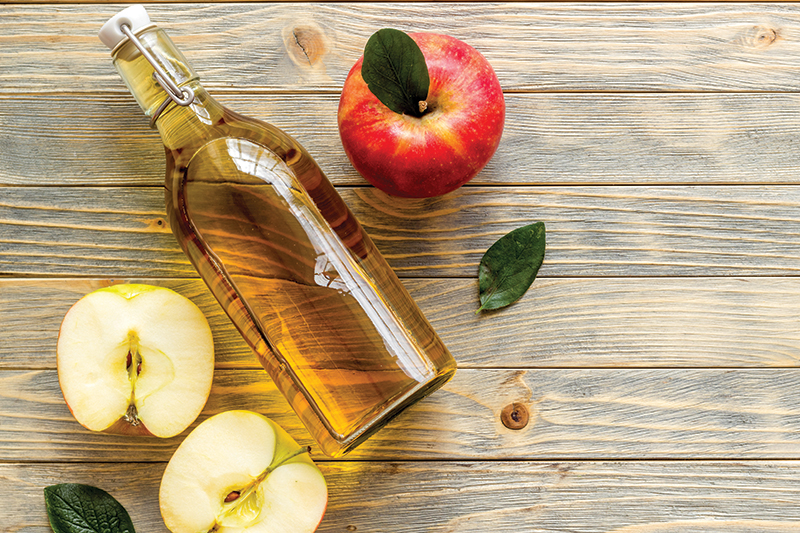Vinegar, a liquid utilized for the fermentation of various raw materials, carries a captivating history. It all began in ancient Babylon, where wine’s inadvertent discovery from forgotten grape juice led to vinegar, a potent food preservative. By 420 BC, Greek physician Hippocrates identified its medicinal applications, particularly for wound treatment.
In the 21st century, vinegar remains popular, particularly apple cider vinegar (ACV) for its healing properties. Personal anecdotal accounts abound. I’m sure you’ve heard the buzz about the healing benefits of the most popular vinegar—apple cider.
I first learned about apple cider vinegar 45 years ago when I found my grandmother in her kitchen swigging a tablespoon of vinegar for whatever health benefits she thought it offered. After downing her spoonful and recovering from the awful taste, she admitted she didn’t know the health benefits, but several of her church friends were doing it, and she didn’t want to be left out! I honestly thought she lost her mind.
Unfortunately, she was drinking distilled vinegar rather than organic, which is the kind she should have been drinking. Her results were nothing more than a bad taste in her mouth and a few side effects.
- Acid reflux
- A slight upset stomach
- Dental damage from the loss of enamel
But were the Church Ladies wrong to believe there were health benefits? As it turns out, they weren’t too far off if they had been drinking the right kind of vinegar…
Today, health claims around ACV range from weight loss to cancer treatment, heart health improvement, dandruff control, and boosting the immune system. However, these claims are not universally supported. Some research, including a small Japanese study, has suggested that vinegar could help with weight loss and improve insulin levels in type 2 diabetics. But a comprehensive scientific consensus is yet to be reached, with sources like Harvard Edu Health Blog and WebMD calling for more research. The consumption of vinegar-based beverages thus remains a personal choice, with users urged to exercise caution due to its potential adverse effects.
Taking a historical detour, vinegar-based recipes have been around for centuries, known by different names such as Four Thieves, Cyclone Cider, Oxymels, and Fire Cider. Of these, the Four Thieves recipe stands out, with roots in the 1740s during the Black Plague in France. The name originated from four grave robbers who avoided getting sick, reportedly due to an herb-infused vinegar concoction. They discovered this formula was a natural flea repellent, an important property given the plague was spread by infected fleas.
Fast forward to the late 1970s and ‘80s, herbalist Rosemary Gladstar revamped the ancient Four Thieves recipe into a more palatable and modern version. She named it Fire Cider, with ingredients easily sourced. The tonic boosts the immune system during cold and flu seasons and is often used as the first defense in reducing cold and flu symptoms.
Rosemary has freely shared her base recipe. However, herbalists have adapted it over the years to suit their needs. Since I grow so many immune-boosting herbs in the garden, I’ve added to the base recipe to create my own version.
Rosemary’s Base Ingredients
- Ginger root
- Horseradish root
- Onions
- Garlic
- Jalapeno peppers
- Lemons and or oranges
- Several sprigs of fresh organic rosemary or 2 tbsp of dried rosemary leaves
- Turmeric roots
- Cayenne powder
- Apple cider vinegar
- Local raw honey
Additional Ingredients
- Rose hips (can use contents from tea bags or dried berries)
- Burdock root (fresh)
- Echinacea root and dried flowers
- Ghost pepper powder blend
- Cinnamon sticks
- Dried turkey tail or reishi mushrooms
- Thyme
Herbal Ingredient Actions
- Finely chop ingredients into a clean glass jar and fill to top with organic ACV.
- Cover and let sit for six weeks.
- Strain herbs, save liquid, and re-jar in clean mason jars.
- Directions: One shot glass of fire cider sweetened with honey to taste.
Carminative • Anti-Inflammatory • Analgesic |
||
Nutritive • Antiseptic • Hypotensive |
||
Respiratory • Digestive |
||
(*Remember vinegar can drop your potassium level, so this is a good way to replace it) |
||
High in Vitamin C • High in Potassium* |
Immune |
|
High in Vitamin C • High in Potassium* |
Immune |
|
Antidepressant • Rubefacient Antimicrobial • Emmenagogue |
||
Anti-arthritic • Antiseptic |
||
Diaphoretic • Antispasmodic • Circulatory Tonic • Carminative • Rubefacient |
||
Natural sweetener (makes herbs more palatable) |
||
Antispasmodic • High in Vitamin C |
||
Diaphoretic (fresh only) Urinary Tonic • Demulcent |
||
Antimicrobial • Vasodilator |
||
Diaphoretic • Antispasmodic • Circulatory Tonic • Carminative • Rubefacient |
||
Mild Emmenagogue |
Relieves cold and other virus conditions Immune |
|
Emmenagogue • Vermifuge |
||
Brenda Sullivan is the proprietor of Thompson Street Farm and Farm to Bath and is an avid herbalist. Her garden, where she grows medicinal flowers and herbs for her bath and body products, is a source of endless joy and knowledge. Using herbs has given Brenda and her family an improved quality of life. Brenda loves sharing her herbal insights on her podcast and YouTube channel, Living and Lovin Herbs.
Websites: https://www.farmtobath.com/ www.livingandlovinherbs.com.
